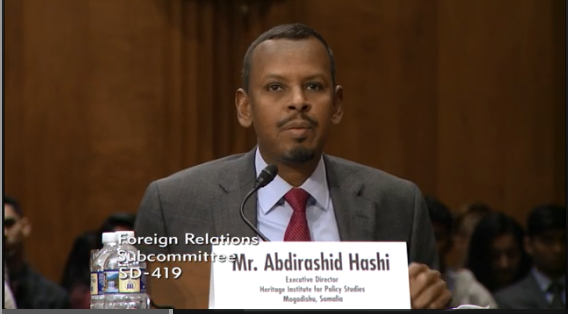Political bickering a major threat to Somalia’s stability-analyst


Political squabbling is the single most threat to Somalia’s stability, Abdi Hashi, the director of Mogadishu based think tank HIPS told the US Foreign Relations Subcommittee Wednesday.
Testifying before the subcommittee on the current security and stability of Somalia, Hashi said the infighting among the political class is compounding an already difficult situation thanks to terrorism and weak state structures.
“A winner takes all mentality reigns throughout the country, creating deep political instability,” Hashi said as a motion against Lower House speaker Mohamed Jawari was on course in Mogadishu. “Whenever we get an opportunity to move forward, our, politicians end up in unnecessary political infighting which is going on in Mogadishu today.”
“In a country where political and social reconciliation remain a work in progress,” Hashi told the committee, “Somalia’s elite has failed to rise to the occasion and unite against the common enemy—Al-Shabaab.”
The political analyst noted politicians have instead opted to spend much needed resources and energy on political infighting at the expense of the country’s stability and progress.
As he fielded questions from the subcommittee, in Mogadishu reports were filtering in of a failed bid to unseat Jawari in a motion backed by majority of government ministers. The motion ran into a quorum hitch after 16 lawmakers pulled out.
Jawari told reporters in a media conference attended by his deputy Abdiweli Mudey the motion was illegitimate but in a twist of events, Mudey few hours later took a U-turn telling journalists in his residence Wednesday night the motion was within the confines of the Standing Orders and that it can only fail if the sponsors of the motion formally withdraw it from the floor of the House.
EXTERNAL INTERFERENCE
External meddling by foreign actors especially from the Gulf is also a major concern in Somalia’s stability, the Heritage Institute for Policy Studies director said.. “Interference by others has ceaselessly muddied Somalia’s already troubled waters.”
“The negative energies emanating from both state and non-state actors can be as damaging as the mischief and mediocrity of Somali politicians and the mayhem of Al Shabaab.”
Addressing the same committee, Tricia Bacon, assistant professor at American University’s School of Public Affairs warned the withdrawal of Amisom from Somalia portended a grave risk to Somalia’s stability.
“AMISOM withdrawal will almost certainly allow al-Shabaab to re-gain substantial territory and influence and may even lead to the collapse of the Somali Federal Government.” Said Baco.
“However, the funding for AMISOM remains uncertain, and it is that uncertainty, not the stability of the situation in Somalia and capability of the Somali National Army, which has motivated the withdrawal plans.”